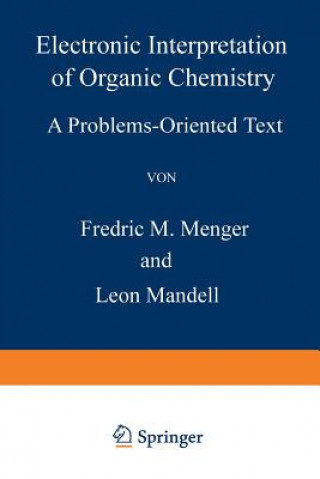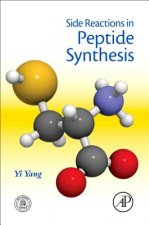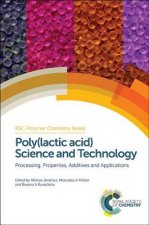
Code: 02175176
Electronic Interpretation of Organic Chemistry
by F. M. Menger
Most standard texts in basic organic chemistry require the student to memorize dozens of organic reactions. This is certainly necessary to master the discipline. Unfortunately, most texts do not emphasize why these reactions occur ... more
- Language:
 English
English - Binding: Paperback
- Number of pages: 218
Publisher: Springer-Verlag New York Inc., 2012
- More about this

61.28 €

Low in stock at our supplier
Shipping in 13 - 16 days
Potřebujete více kusů?Máte-li zájem o více kusů, prověřte, prosím, nejprve dostupnost titulu na naši zákaznické podpoře.
Add to wishlist
You might also like
-

Ich traue mich dir an
5.93 € -

Belle Antonia. Tome 2
27.87 € -

Manipulation of the Avian Genome
407.27 € -

No direction home - Das Dilemma der Ungleichzeitigkeit
6.03 € -

Face of the Earth
142.79 € -

Fermi Surfaces of Low-Dimensional Organic Metals and Superconductors
61.28 € -

Fiat X1/9
45.28 € -9 %
Give this book as a present today
- Order book and choose Gift Order.
- We will send you book gift voucher at once. You can give it out to anyone.
- Book will be send to donee, nothing more to care about.
More about Electronic Interpretation of Organic Chemistry
You get 154 loyalty points
 Book synopsis
Book synopsis
Most standard texts in basic organic chemistry require the student to memorize dozens of organic reactions. This is certainly necessary to master the discipline. Unfortunately, most texts do not emphasize why these reactions occur and, just as important, why other reactions that might seem conceivable to the student do not occur. Without this understanding, students tend to forget what they have memorized soon after the course is over. It is the purpose of this book to familiarize the student with the principles governing organic reactivity and to provide a "feel" for organic chemistry that is impossible to secure by memory alone. Digesting the ideas in this book will, we hope, not only explain the common organic reactions but also allow the student to predict the prod ucts and by-products of reactions he has never seen before. Indeed, the creative student might even become capable of designing new reactions as might be required in a complex organic synthesis. In Chapter 1, we cover the basic principles including bonding, nuclear charge, resonance effects, oxidation-reduction, etc. It is a brief discussion, but it nonetheless provides the basis for understanding reaction mechanisms th~t will be treated later on. We highly recommend that this material be reviewed and that the v VI PREFACE problems be worked at the end of the chapter. Answers are given to all problems. In Chapter 2, reaction mechanisms are presented in an increas ing order of difficulty.
 Book details
Book details
Book category Books in English Mathematics & science Chemistry Organic chemistry
61.28 €
- Full title: Electronic Interpretation of Organic Chemistry
- Subtitle: A Problems-Oriented Text
- Author: F. M. Menger
- Language:
 English
English - Binding: Paperback
- Number of pages: 218
- EAN: 9781468436679
- ISBN: 1468436678
- ID: 02175176
- Publisher: Springer-Verlag New York Inc.
- Weight: 342 g
- Dimensions: 155 × 260 × 16 mm
- Date of publishing: 19. March 2012
Trending among others
-

3000 Solved Problems in Organic Chemistry
39.44 € -19 % -

March's Advanced Organic Chemistry - Reactions, Mechanisms, and Structure, Eighth Edition
171.98 € -1 % -

Solomons' Organic Chemistry
80 € -

Organic Chemistry
78.49 € -8 % -

Molecular Model Set for Organic Chemistry
31.79 € -

Organic Chemistry, Global Edition
101.23 € -

Workbook for Organic Synthesis: The Disconnection Approach
59.47 € -

Brown's Introduction to Organic Chemistry
66.41 € -4 % -

Radical Chemistry: The Fundamentals
44.07 € -

Molymod MMS-003
47.69 € -5 % -

Organic Chemistry
434.44 € -

Advanced Organic Chemistry
96.80 € -12 % -

Advanced Organic Chemistry
66.61 € -12 % -

Strategic Applications of Named Reactions in Organic Synthesis
112.50 € -9 % -

Organic Synthesis - The Disconnection Approach 2e
43.46 € -3 % -

Organic Chemistry I For Dummies, 2nd Edition
16.70 € -35 % -

Solutions Manual to accompany Organic Chemistry
127.40 € -

Modern Physical Organic Chemistry
152.66 € -

Organic Chemistry: A Very Short Introduction
9.95 € -29 % -

Organic Synthesis - Strategy and Control
71.94 € -7 % -

Organic Chemistry of Biological Pathways
108.17 € -2 % -

Molecular Orbitals and Organic Chemical Reactions - Student Edition
56.55 € -7 % -

Fundamentals of Organic Chemistry, International Edition
98.71 € -

Injection Molding Handbook
81.51 € -2 % -

Process Development
38.03 € -

Organic Stereochemistry
41.15 € -

Organic Chemistry with Biological Applications
119.24 € -

Nonlinear Optical Effects and Materials
61.28 € -

Side Reactions in Peptide Synthesis
89.15 € -13 % -

Amino Acids and Proteins for the Athlete: The Anabolic Edge
255.10 € -

Directed Selectivity in Organic Synthesis - A Practical Guide
68.83 € -10 % -

Diagnostics of Extrusion Processes
14.98 € -6 % -

Silica Aerogel Composites
120.75 € -

Organic Chemistry
88.85 € -4 % -

Polymeric Foams and Foam Technology
304.82 € -4 % -

Organic Chemistry as a Second Language - First Semester Topics, Fifth Edition
96.30 € -

Workbook in Organic Chemistry
38.03 € -

Modern Methods of Organic Synthesis
123.67 € -

Classics in Total Synthesis - Targets, Strategies, Methods
92.78 € -4 % -

Poly(lactic acid) Science and Technology
244.94 € -

Advanced Practical Organic Chemistry
105.56 € -5 % -

Workbook for Organic Synthesis - Strategy and Control
101.33 € -

Mechanisms of Organic Reactions
41.15 € -

Organometallics 3e
78.08 € -19 % -

Organic Chemistry
175.70 € -5 % -

Applied Organometallic Chemistry and Catalysis
41.15 € -

Schaum's Outline of Organic Chemistry
29.07 € -13 % -

Chemistry of the Carbonyl Group - A Step-by-Step Approach to Understanding Organic Reaction Mechanisms - Revised Edition
52.52 € -8 % -

Polymer Degradation and Stabilization
108.38 € -2 %
Collection points Bratislava a 2642 dalších
Copyright ©2008-24 najlacnejsie-knihy.sk All rights reservedPrivacyCookies


 15549 collection points
15549 collection points Delivery 2.99 €
Delivery 2.99 € 02/210 210 99 (8-15.30h)
02/210 210 99 (8-15.30h)